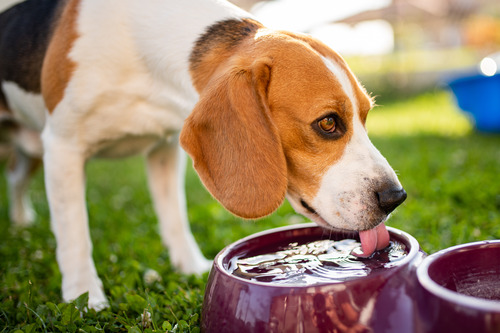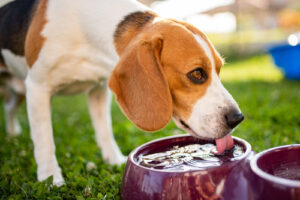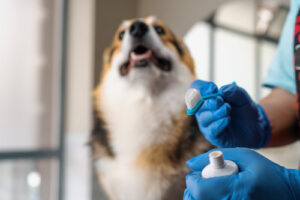If you’ve noticed your dog drinking more water than usual, it’s natural to feel a little concerned. A change in drinking habits can sometimes mean your pet is simply more active or warm, but it can also point to an underlying health issue. Because water is vital for dogs to regulate body temperature and support organ function, it’s important to recognize when excessive thirst crosses into abnormal territory. This blog will explore what can cause a dog to drink large amounts of water, when it’s time to speak with your veterinarian, and how to better understand what’s normal for your dog. If your dog has been drinking noticeably more water than usual, call Sunset Animal Hospital in Houston at (713) 526-5881 or book an appointment online today.
What’s Considered “Normal” Water Intake for Dogs?
Most healthy dogs drink about one ounce of water per pound of body weight per day. That means a 50-pound dog should typically consume around 50 ounces of water daily, or just over six cups. This can vary slightly depending on the weather, your dog’s activity level, age, and diet. Dogs that eat mostly dry food tend to drink more water than those on canned or raw diets, since dry kibble contains less moisture.
Take Note of Frequent Refills or Water Bowl Visits
If you notice your dog’s water bowl needs constant refilling or that they’re visiting it far more often than usual, it’s worth tracking how much water they drink in a 24-hour period. Mark the water level in their bowl and refill using a measuring cup. Keeping a simple log for a few days can help your veterinarian determine whether your dog is truly drinking excessively, which is clinically known as polydipsia.
Why Is My Dog Drinking Lots of Water?
There are many reasons a dog might begin drinking more water. Some are perfectly harmless, while others require veterinary attention. Let’s look at some common causes below.
Heat and Exercise
Increased physical activity or warmer temperatures naturally raise your dog’s water needs. After a long walk or play session, or during Houston’s hotter months, dogs may drink much more than they normally would. This type of increased water consumption is usually short-lived and returns to normal once your dog cools down and rests.
Dietary Factors
Dogs fed primarily dry kibble typically need more water throughout the day. Diets high in sodium—such as certain treats or human foods—can also cause dogs to drink more. If your dog recently switched to a different food or has been getting more salty snacks, that could explain the change in thirst.
Medications That Affect Thirst
Some medications can increase thirst as a side effect. These may include anti-inflammatory drugs like prednisone, certain seizure medications, or diuretics used to manage heart conditions. If your dog is on medication and begins drinking more water, let your veterinarian know, as dosage adjustments or alternative options may be available.
Health Conditions That May Cause Excessive Thirst
If your dog’s increased water intake isn’t linked to diet, weather, or activity, it may be time to consider possible medical causes. Some health issues that lead to excessive drinking can be serious if not addressed promptly.
Diabetes Mellitus
In dogs with diabetes, the body struggles to process glucose properly. This leads to high blood sugar levels, which trigger excessive urination and increased thirst. If your dog is drinking lots of water and also losing weight or having accidents in the house, diabetes could be a factor.
Kidney Disease
Kidneys help regulate water balance and eliminate waste. When they’re not functioning properly, water loss through urine increases, causing your dog to drink more to compensate. Kidney disease is more common in older dogs and may also cause symptoms like bad breath, decreased appetite, or lethargy.
Cushing’s Disease
Cushing’s disease, or hyperadrenocorticism, results from an overproduction of cortisol in the body. One of the most common early signs is increased drinking and urination. Dogs with Cushing’s may also have a pot-bellied appearance, thinning skin, or hair loss.
Urinary Tract Infections (UTIs)
UTIs can irritate the bladder, causing dogs to urinate more frequently and in smaller amounts. To avoid dehydration, they may begin drinking more water than usual. Dogs with UTIs may also strain to urinate or have blood in their urine.
When Should I Contact My Veterinarian?
While a small increase in water intake every now and then may be normal, ongoing or sudden excessive thirst should not be ignored. If your dog has been drinking lots of water consistently for more than a couple of days—or if the behavior is accompanied by other changes like lethargy, vomiting, appetite loss, or accidents in the house—it’s time to schedule an exam.
Your veterinarian may recommend diagnostic testing such as bloodwork, a urinalysis, or imaging to identify the cause. The sooner you can uncover the reason behind your dog’s thirst, the sooner you can take steps to support their health and comfort. For Houston-area pet owners, Sunset Animal Hospital can help. Call (713) 526-5881 or book an appointment online for a thorough evaluation.
How to Monitor Your Dog’s Water Intake at Home
Keeping an eye on how much your dog drinks each day can provide important clues about their overall health. Here are a few simple ways to track water intake at home:
- Use a measuring cup to fill your dog’s water bowl so you can monitor exact amounts.
- Refill the bowl at the same time each day to establish a baseline.
- Consider a pet water fountain with volume markers.
- Watch for signs like empty bowls, longer or more frequent drinks, or increased urination.
If you’re unsure whether your dog’s drinking habits are out of the ordinary, record observations for a few days and share them with your vet. This information can be especially helpful during an exam.
What Happens If a Dog Drinks Too Much Water?
Although rare, water intoxication can happen when a dog drinks too much water too quickly—usually while playing in water, such as during fetch in a pool or lake. This can cause electrolyte imbalances and lead to symptoms like vomiting, bloating, lethargy, or in severe cases, seizures. More commonly, however, excessive water intake signals an underlying condition that needs attention. Chronic overhydration can put strain on your dog’s kidneys and lead to further imbalances in the body. That’s why it’s important not to brush off significant changes in your dog’s drinking behavior.
Don’t Ignore the Signs—Protect Your Dog’s Health
Changes in your dog’s water intake can be easy to overlook, but they often provide valuable insights into their health. Whether your dog is drinking more due to heat, diet, or something more serious, it’s always a good idea to check in with your veterinarian when something feels off. If you’re in the Houston area and have concerns about your dog drinking lots of water, call Sunset Animal Hospital at (713) 526-5881 or book an appointment online. Our team is here to support you and provide the care your pet needs—because staying informed is one of the best ways to help your dog stay well.





